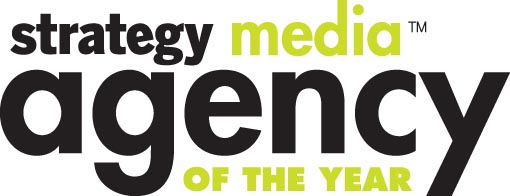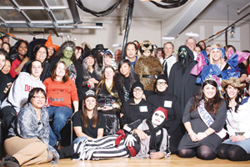Gold — PHD
It can be said that PHD acts with surgical precision when executing media programs. After all, it got the Gold, and that takes an adroit hand. Its recent track record illustrates it: winning Bronze in 2008 (the inaugural juried MAOY), and cracking the top five in 2009, plus throwing in a Grand Prix from the Internationalist for good measure.
It was PHD’s work on the “Abrupt Endings” campaign for Suicide Action Montreal that nabbed that last award. Successful work for Unilever Canada on Becel’s “Love Your Heart” effort and Axe’s “Hair Games” have also done well to pad its resumé.
Certainly, helping PHD stitch together media solutions has been its emphasis on creativity and collaboration, two things grafted onto its DNA. Its Canadian sponsorship of World Creativity Week is one way in which the agency has exhibited its artistic learnings.
“It made a lot of sense for us in terms of being representative of what we believe and what we think we’re all about,” says Fred Forster, president and CEO, PHD Canada.
The theme at PHD this year was “Recess,” which saw its employees take short breaks during their workday to write, draw, show and tell, and generally escape the daily grind to spend more time with the right side of their cerebrums. Now the PHD network is looking at sponsoring Creativity Week globally.
The association began in 2005 when the agency started working with Toronto-based creativity consultant and Creativity Week founder Marci Segal, to create an internal 18-month management skill-building program called Passport to Innovation.
“That more than anything else has helped us and has really defined us in terms of the creative work we’ve been doing,” says Forster. “We’re always looking for ways to heighten the sensitivity towards creativity, to make sure there’s an ongoing awareness that we want to inspire people to do great creative work.”
That philosophy extends right down to PHD offices. Montreal-based Touché!PHD, for example built a room specifically for brainstorming, which Alain Desormiers, president, Touché!PHD, says is like something you would see in a creative agency – beanbag chairs, lots of windows, you get the idea.
Of course, both Forster and Desormiers agree that given a rapidly changing media landscape, continued emphasis on creative collaboration, not just internally, but through more immersive relationships with creative partners and clients, is what will drive success for their agency. Lately PHD has also been taking steps to further improve upon the science behind what it does.
“The media agency of the future’s role is really switching from being a facility that just determines strategy and executes, to a facility that really is in the business of staying with consumers in real time,” says Forster. “And, what goes along with that is having metrics and analytics that follow the consumer in real time.”
Thus was born Hive, a tool PHD developed in the U.S. that asks a roster of people across North America open-ended questions online and gets consumer sentiment in real time. Implemented in Canada this year, it allows the agency to gather rich data on the cheap, which provides qualitative and quantitative measures of how people feel about its brands and how those brands stack up against competitors.
“That information is crucial in determining what the communications strategy should be and it gives you really good nuanced information that you can’t get from syndicated studies, or from an online panel, and you can get that information right away.”
So, what else will agencies have to do in order to foster success in the future? Well, it’s to be sure that PHD has a pretty good idea. After all, they wrote the book (see Media Agency 2014: PHD on the Future of the Media Agency).

